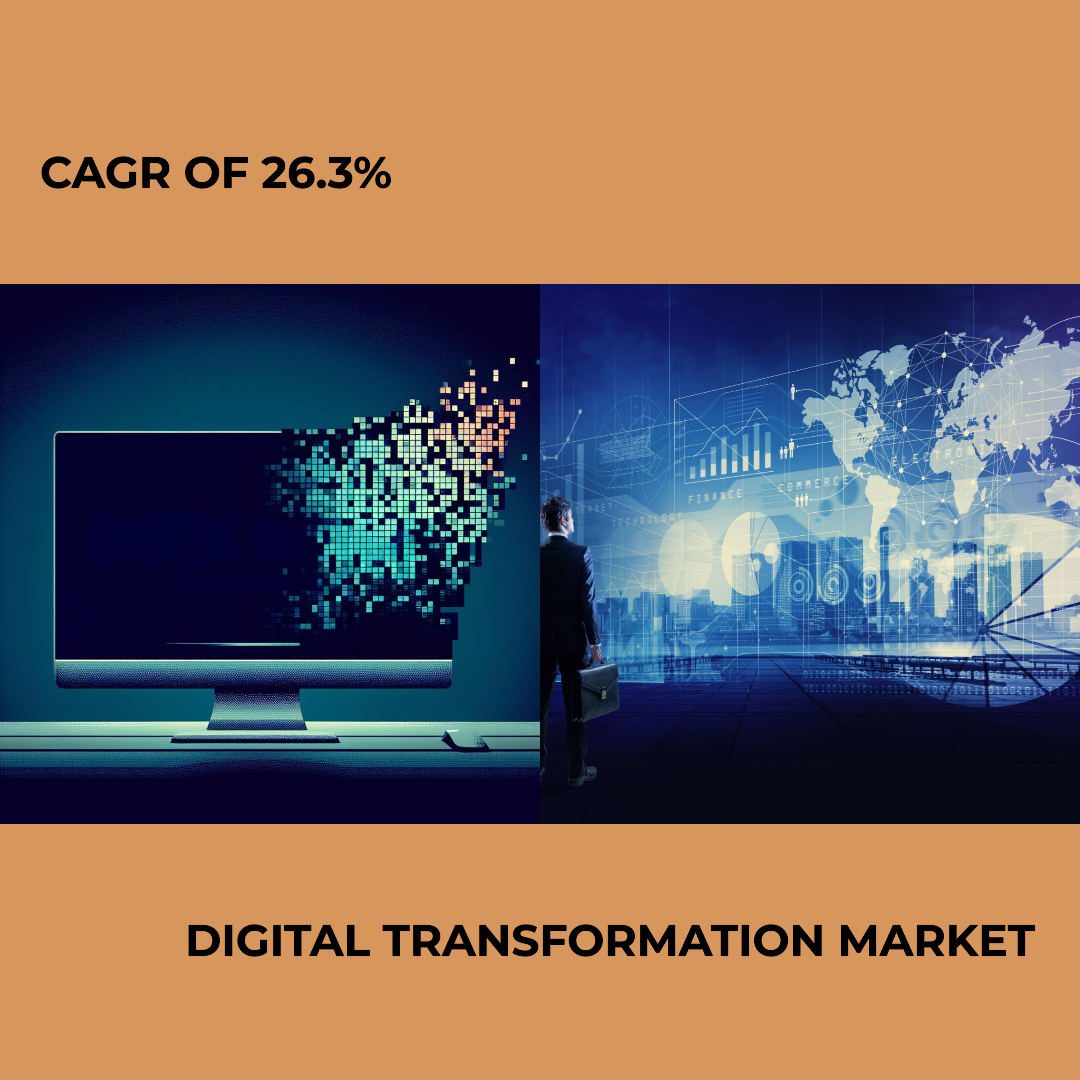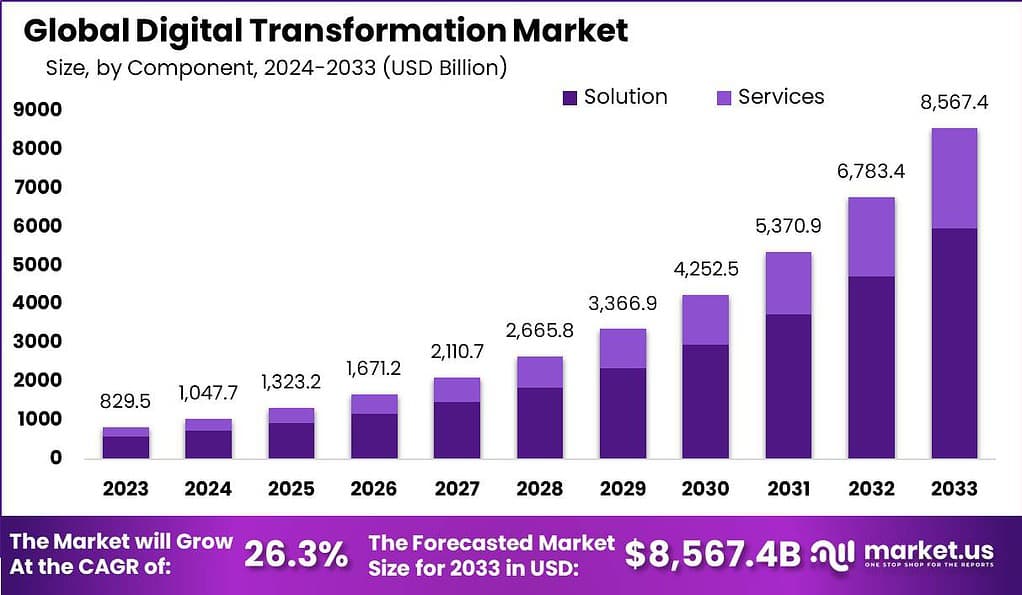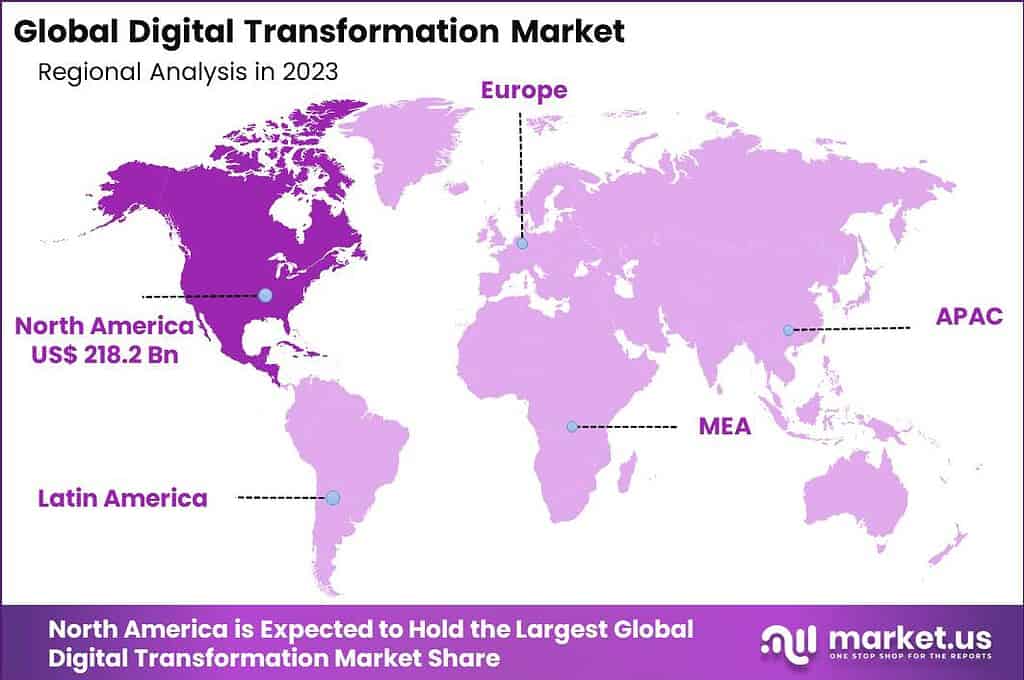Digital Transformation Market Sales Set to Total USD 8,567.4 billion by 2033

Page Contents
Introduction
Digital transformation refers to the integration of digital technology into all aspects of business operations, fundamentally changing how companies operate and deliver value to customers. This paradigm shift encompasses the adoption of digital tools and technologies such as cloud computing, artificial intelligence, Internet of Things (IoT), and data analytics to streamline processes, enhance customer experiences, and drive innovation.
In recent years, the digital transformation market has witnessed significant growth reach a staggering USD 8,567.4 billion by 2033, riding on a robust compound annual growth rate (CAGR) of 26.3% from 2024 to 2033, fueled by the increasing demand for improved efficiency, agility, and competitiveness across industries. Companies are increasingly recognizing the need to embrace digital transformation to stay relevant in today's rapidly evolving business landscape.
Don’t Miss Out: Get Your Hands on Our PDF Sample Report

Analyst Viewpoint
From an analyst's perspective, several key driving factors are propelling the digital transformation market forward. Firstly, the relentless pace of technological innovation is driving organizations to modernize their operations to remain competitive. Additionally, the growing emphasis on customer-centricity is pushing businesses to leverage digital solutions to better understand and cater to customer needs.
Furthermore, the COVID-19 pandemic has accelerated the adoption of digital transformation initiatives as companies seek to adapt to remote work environments and changing consumer behaviors. This unforeseen global crisis has highlighted the importance of digital resilience and agility in navigating uncertain times.
Amidst these challenges lie ample opportunities for businesses to capitalize on digital transformation. For instance, leveraging big data and analytics can provide valuable insights for informed decision-making and personalized customer experiences. Similarly, the proliferation of IoT devices offers new avenues for optimizing processes and driving operational efficiency.
Facts and Latest Statistics
- The global digital transformation market is estimated to reach a staggering USD 8,567.4 billion by 2033, riding on a robust compound annual growth rate (CAGR) of 26.3% from 2024 to 2033.
- Digital transformation is the integration of digital technology into all areas of a business, fundamentally changing how it operates and delivers value to customers.
- It involves the use of digital technologies such as cloud computing, artificial intelligence, big data analytics, and the Internet of Things (IoT) to improve business processes, enhance customer experience, and drive innovation.
- Adoption of digital technologies like AI, cloud computing, and IoT streamlines operations, reduces costs, and boosts productivity, contributing to an expected 26.3% CAGR from 2024 to 2033.
- By 2023, digitally transformed entities are projected to contribute over 50% of the global GDP, signaling the significant role of digital transformation in economic growth.
- Solutions dominate the market, capturing more than a 69.7% share in 2023, driven by the demand for digital business solutions across various industries.
- On-premise solutions hold a dominant position, capturing more than a 63.9% share in 2023, favored for data security and customization benefits.
- Big Data & Analytics lead the market, capturing more than a 30.1% share in 2023, fueled by the exponential growth of data across sectors.
- Large enterprises drive digital transformation, capturing more than a 61.5% share in 2023, leveraging financial resources and global operations.
- The BFSI sector dominates with a larger revenue share of 27.4% in 2023, driven by the need for improved customer experience and regulatory compliance.
- North America emerges as the dominant player with a significant market share of over 41.9% in 2023, boasting a highly developed digital infrastructure and widespread adoption of digital technologies across various sectors.
- Major players in the market include IBM Corporation, Microsoft Corporation, Amazon Web Services, Inc., Google LLC, SAP SE, and others. These companies engage in strategic partnerships, collaborations, and mergers to strengthen their market presence.
- Global Spending on Digital Transformation: By 2026, global spending on digital transformation is projected to reach an impressive $3.4 trillion.
- Denmark's Digital Competitiveness: Denmark emerged as the most digitally competitive country globally in 2022.
- Rise in Priority for Digital Transformation: Around 74% of organizations now consider digital transformation as their top IT priority in 2022, a significant increase from approximately half in 2021.
- Impact of COVID-19 on Digital Transformation: The COVID-19 pandemic accelerated digital transformation initiatives for 97% of companies.
- Core Transformative Technologies: Artificial intelligence (AI), big data, and cloud computing are core transformative technologies with broad applications across multiple industries.
- Specialized Robotics in Manufacturing: Sectors like manufacturing are adopting specialized robotics as part of their digital transformation efforts.
- Customer Willingness to Spend: Approximately 86% of customers are willing to spend more for improved customer service.
- Job Creation: Digital transformation is anticipated to generate around 12 million new jobs globally by 2025.
- Digital Maturity by Sector: According to a report by the SAP Center for Business Insights and Oxford Economics, the high tech (72%), professional services (58%), and banking sectors (58%) lead in digital maturity, while industries like consumer products (33%) and retail (33%) lag behind.
- Cultural Change in Businesses: 80% of businesses state that their digital transformation efforts involve a cultural change promoting risk-taking, innovation, and continuous learning.
- Engagement of Small Businesses: A survey by Zoho reports that 63% of small businesses are actively engaged in digital transformation projects or plan to start soon.
- GDPR Compliance Spending: The International Association of Privacy Professionals (IAPP) survey revealed that Fortune 500 companies are expected to spend $7.8 billion to comply with GDPR.
Regional Analysis
North America's Dominance in Digital Transformation
In 2023, North America solidified its position as the leading player in the global digital transformation market, capturing a substantial market share of over 41.9%. The demand for digital transformation solutions surged in North America, reaching a valuation of US$ 218.2 billion in the same year, with further significant growth anticipated in the forecast period.
Several factors contribute to North America's leading position in digital transformation. Firstly, the region boasts a robust and advanced technological infrastructure, with widespread access to high-speed internet and cutting-edge digital technologies. This strong foundation provides businesses with the necessary infrastructure to implement and leverage digital transformation initiatives effectively.
Moreover, North America is home to a thriving ecosystem of innovative tech companies, startups, and research institutions driving continuous advancements in digital technologies. This dynamic environment fosters a culture of innovation and entrepreneurship, encouraging organizations to adopt and invest in digital transformation solutions to maintain competitiveness and drive growth.

Impactful Driver
The growth of a market can often be attributed to several key drivers, among which technological advancements stand out. These advancements enable the development of new products and services, improve operational efficiencies, and enhance customer experiences. For instance, in the healthcare industry, cutting-edge technologies such as artificial intelligence and machine learning are revolutionizing patient care and research methodologies. The adoption of these technologies leads to more accurate diagnoses, personalized treatments, and, ultimately, better health outcomes. As such, technological innovation serves as a critical driver, propelling industries forward by fostering growth, attracting investments, and stimulating competition.
Major Challenges
Despite the positive momentum driven by such factors, industries face significant challenges that could impede growth. Regulatory hurdles emerge as a primary concern, especially in sectors like healthcare, finance, and energy, where compliance with legal standards is paramount. These regulations, while necessary for ensuring safety and fairness, can often be complex and rapidly evolving, placing a considerable burden on businesses to stay compliant. Additionally, the threat of cyber security breaches looms large, with the increasing digitization of operations and services making industries more vulnerable to attacks. Such challenges necessitate ongoing vigilance, innovation in security practices, and a proactive approach to regulatory compliance, all of which require substantial resources and expertise.
Broader Benefits
The broader benefits of industry growth extend well beyond economic gains, contributing to societal well-being and environmental sustainability. Industries that prioritize innovation and sustainability can drive positive change, such as reducing carbon footprints, improving energy efficiency, and promoting social responsibility. For example, the renewable energy sector not only addresses the urgent need for clean energy but also creates job opportunities, stimulates technological innovation, and contributes to energy security. Furthermore, advancements in healthcare and technology have the potential to improve quality of life, extend life expectancy, and bridge gaps in access to services. Thus, the ripple effects of industry growth can lead to substantial improvements in societal conditions and the global environment.
Top 13 Largest Companies
- IBM Corporation is renowned for its significant contributions to the computing industry, from pioneering hardware innovations to leading in cloud computing and artificial intelligence through its Watson platform. IBM's commitment to research and development positions it as a leader in pushing the boundaries of technology.
- Microsoft Corporation has profoundly impacted the software industry, with its Windows operating systems and Office productivity suite being ubiquitous in personal and professional environments. Microsoft has also successfully pivoted to cloud computing, with Azure being a major player in the cloud services market.
- Amazon Web Services, Inc. (AWS) dominates the cloud computing sector, offering a wide array of cloud services that enable companies to scale and innovate. AWS's infrastructure is pivotal for countless startups and enterprises, supporting a vast ecosystem of applications and services.
- Google LLC, part of Alphabet Inc., is not only the leading internet search provider but also a key player in cloud computing, digital advertising, and consumer electronics. Google Cloud Platform offers robust cloud services, and its Android operating system powers a significant portion of the world's mobile devices.
- SAP SE specializes in enterprise resource planning (ERP) software, helping organizations of all sizes and industries run their operations more efficiently. SAP's software solutions are critical for business processes and data management.
- Cisco Systems, Inc. leads in networking and cybersecurity solutions, essential for the infrastructure of the modern internet. Cisco's products and services facilitate secure and reliable connectivity for businesses globally.
- Salesforce, Inc. revolutionized customer relationship management (CRM) software, offering cloud-based solutions that enhance customer service, marketing automation, and business analytics. Salesforce's platform enables companies to connect with their customers in entirely new ways.
- Oracle Corporation provides a comprehensive and fully integrated stack of cloud applications, platform services, and engineered systems. Known for its database software and technology, cloud engineered systems, and enterprise software products, Oracle is a key provider of enterprise IT solutions.
- Tata Consultancy Services Limited (TCS), part of the Tata Group, is a leading global IT services, consulting, and business solutions organization. TCS offers a range of IT and consultancy services, driving innovation and transformation for global businesses.
- Accenture Plc is a global professional services company, providing a broad array of services and solutions in strategy, consulting, digital, technology, and operations. Accenture's expertise spans multiple industries, helping clients improve their performance and create sustainable value.
- Adobe Inc. is synonymous with creative software and digital marketing solutions, known for products like Photoshop, Acrobat, and the Creative Cloud. Adobe's software is essential for content creation, digital media, and marketing analytics.
- Dell Inc. is a major player in the personal computer market, providing a wide range of technology products, including laptops, desktops, and servers. Dell's solutions support businesses and consumers with their computing needs.
- Hewlett Packard Enterprise (HPE) focuses on enterprise technology solutions, offering products and services that range from cloud solutions to data storage and server infrastructure. HPE helps businesses to transform and optimize their operations.
Recent Developments
The collaborations and initiatives of major corporations in the technology sector throughout 2023 showcase their commitment to advancing digital transformation and integrating artificial intelligence (AI) across various industries. Here's an overview of some key developments:
- IBM Corporation: In May 2023, IBM entered a collaboration with SAP to incorporate IBM Watson technology into SAP's suite of solutions. This integration aims to enhance user experiences by providing new AI-driven insights and automation capabilities.
- Amazon Web Services, Inc. (AWS): Throughout 2023, AWS has been proactive in launching and updating its cloud-based services. These developments are instrumental in supporting digital transformation initiatives, offering scalable and efficient solutions across different sectors.
- Cisco Systems, Inc.: In February 2023, Cisco announced a strategic partnership with Microsoft. This collaboration is focused on delivering integrated cloud solutions tailored for enterprise customers, with the goal of facilitating and accelerating their digital transformation journeys.
- Oracle Corporation: Oracle, in May 2023, revealed its collaboration with IBM to integrate IBM Watson technology into SAP solutions. This partnership is designed to leverage AI for providing enhanced insights and automation, thereby aiding in digital transformation efforts.
Contact us
Contact Person: Mr. Lawrence John
Market.us (Powered By Prudour Pvt. Ltd.)
Tel: +1 718 618 4351
Send Email: [email protected]
The team behind market.us, marketresearch.biz, market.biz and more. Our purpose is to keep our customers ahead of the game with regard to the markets. They may fluctuate up or down, but we will help you to stay ahead of the curve in these market fluctuations. Our consistent growth and ability to deliver in-depth analyses and market insight has engaged genuine market players. They have faith in us to offer the data and information they require to make balanced and decisive marketing decisions.